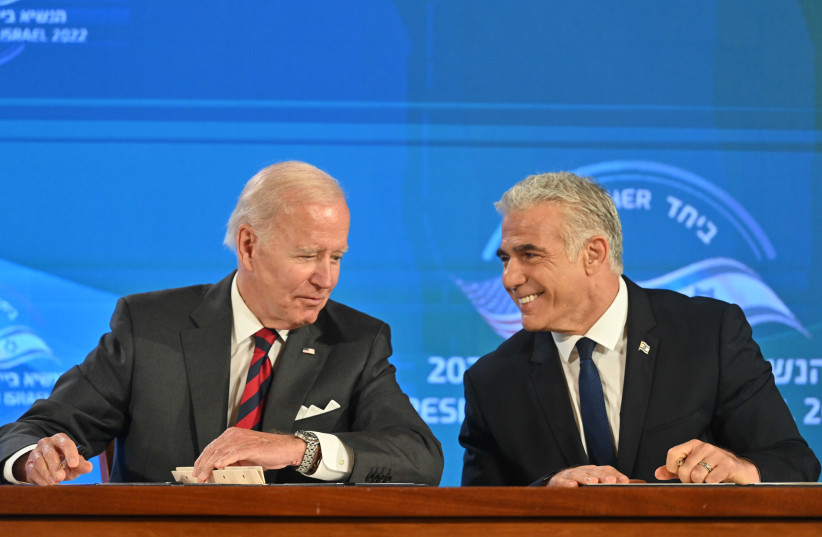On March 27, Yair Lapid, the foreign minister at the time, convened a group of Arab foreign ministers from Morocco, the United Arab Emirates, Bahrain and Egypt in the Negev to participate in an unprecedented regional summit, attended by US Secretary of State Antony Blinken.
That evening, as the foreign ministers gathered for dinner, two Israeli-Arab terrorists affiliated with the Islamic State opened fire on a street in Hadera killing two Border Police officers.
“There was a terrorist attack. I don’t have the details, but I’ll tell you one thing: if we do not condemn it together, now, this summit is over since it would then become just a façade.”
Israeli Prime Minister Yair Lapid
“There was a terrorist attack,” Lapid told the foreign ministers. “I don’t have the details, but I’ll tell you one thing: if we do not condemn it together, now, this summit is over since it would then become just a façade.”
The Arab ministers agreed and together, the group issued a joint statement. It was then, Lapid later explained, that he knew that the Middle East had changed.

A rocky 10 years in Israeli politics, now prime minister
In his 10 years in politics as the leader of Yesh Atid, Lapid’s career has seen its ups and downs. He started as a media star touted as a future prime minister but then left the government in 2015 to spend the next six years in the opposition.
At the same time, his party - Yesh Atid - established itself as one of the smoothest communications and campaign operations Israel has ever seen. But a party that revolves almost entirely around its leader – Lapid determines its list, and anyone who challenged him was gone by the next Knesset – lives and dies by that leader.
Luckily for Yesh Atid, Lapid developed the political skill, the tenacity and the willingness to temporarily set aside his ego necessary to maneuver his way to the top. After the last election, Lapid had the patience and the wisdom to let Naftali Bennett be first in a rotation for the premiership, which meant that Bennett took the fall for the government’s collapse in June.
And while many politicians believed that Lapid would never take up the role, in June he became prime minister of the interim government, allowing him to run in the November election as an incumbent. He will remain premier until another government is formed in the ensuing weeks, and if that doesn’t happen, as it didn’t twice in 2019, he’ll stay in office for a few more months, for yet another election.
How has Lapid shaped Israeli foreign policy?
As foreign minister, Lapid brought sighs of relief to Washington and Western European capitals, which were pleased to hear his emphasis on liberal, democratic values that bring their countries and Israel together. He bolstered the Abraham Accords by launching the Negev Forum and has led what appears to be an effective campaign against a return to the 2015 nuclear deal, which American and Israeli officials now say is delayed at least until the middle of November. Whether it stays that way remains to be seen.
He explained his policy of trying to avoid a public spat at a recent cabinet meeting. “The correct policy,” Lapid said, “is the one that we have been leading in the past year: to continue the pressure, without causing a rupture, to present credible intelligence, to be part of the process without destroying the special relationship with the US.”
And while he has for the most part kept arguments with the Americans under wraps, he has stood up to the Biden administration when he felt Washington was crossing a line. This happened after the US called on Israel to review the IDF rules of engagement following news that an Israeli soldier had likely killed Al Jazeera journalist Shireen Abu Akleh in Jenin.
“No one will dictate our live-fire instructions to us when we are fighting for our lives,” Lapid said earlier this month. “I will not let a fighter in the IDF who defended his life under fire from terrorists be prosecuted just so that we will receive applause abroad.”
Since this is Israel, even though Lapid may be prime minister for only six months, he faced the test of another operation in response to terrorists from Gaza threatening Israeli civilians. Under Lapid’s leadership, the IDF’s Operation Breaking Dawn came to a close within three days, with minimal international pressure, and with significant damage to Islamic Jihad.
Israeli elections
Meanwhile, Lapid is heading to an election with soaring food and housing prices, at a time when surveys show economic issues are Israelis’ top priority.
And while Lapid is trailing behind Netanyahu in the polls, no one believed that he would go from just 19 seats in June to 25 as he gets now in surveys, cutting down the gap between Likud and Yesh Atid to just six or seven seats.
As the past four elections have proven though, that is not as important as the bloc of parties behind him. If Lapid can bring together the Center, Left and Arab parties, he will keep his position of influence.
